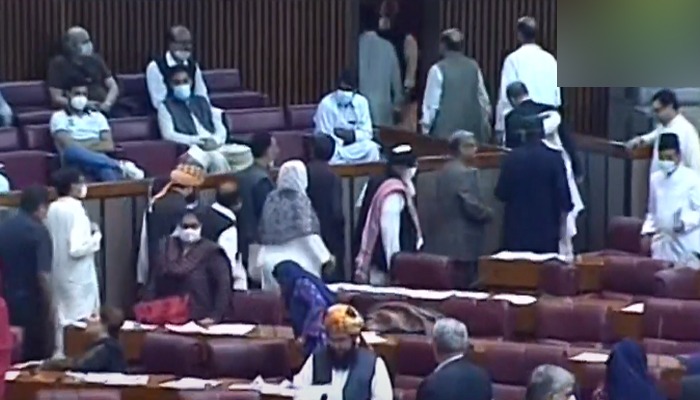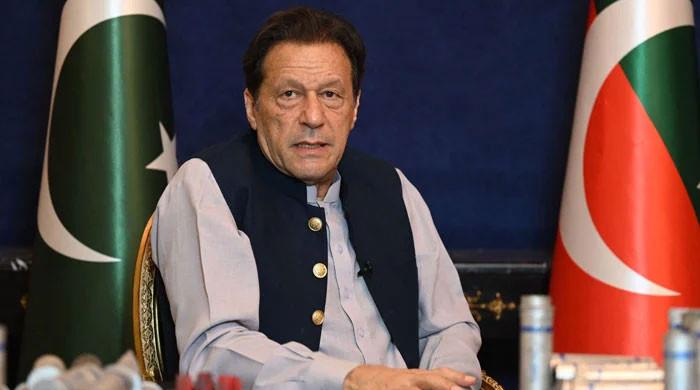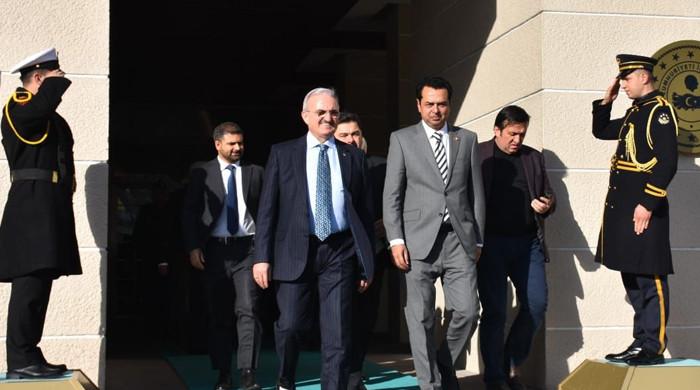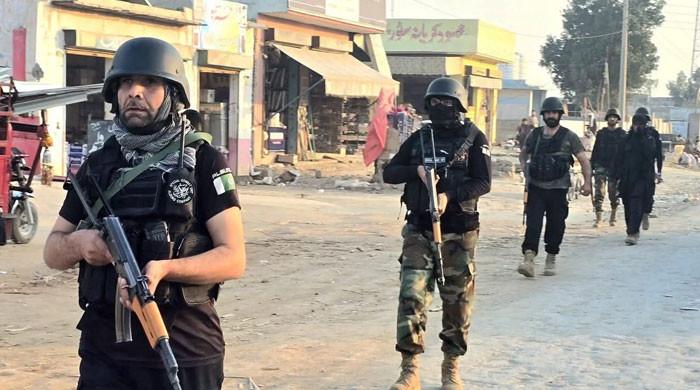3 FATF-related bills passed in joint parliament session, opposition stage walkout
Opposition walk out after most of their proposed amendments to the bills were rejected and they were not allowed to speak
September 16, 2020

ISLAMABAD: A joint sitting of parliament on Wednesday passed amendments in three bills crucial to the fulfilment of the Financial Action Task Force (FATF) requirements.
Prime Minister Imran Khan also attended the session summoned by President Arif Alvi and chaired by National Assembly Speaker Asad Qaiser.
The opposition staged a walk out in protest after most of their proposed amendments to the bills were rejected and they were not allowed to speak.
The three bills that were passed with amendments were the Islamabad Capital Territory Waqf Properties Bill, 2020, Anti-Money Laundering (Second Amendment) Bill and the Anti-Terrorism Act (amendment) Bill, 2020.
According to Radio Pakistan, the Islamabad Capital Territory Waqf Properties Bill is aimed at proper management, supervision, and administration of Waqf properties in the territorial limits of Islamabad Capital Territory.
The Anti-Money Laundering (Second Amendment) Bill, 2020 is "aimed at streamlining the existing anti money laundering law in line with international standards prescribed by FATF", said the publication.
The Anti-Terrorism (Third Amendment) Bill, 2020 aims to curb terror financing.
The session also passed The Surveying and Mapping (Amendment) Bill, 2020 and The Islamabad High Court (Amendment) Bill, 2019.
The Surveying and Mapping (Amendment) Bill, 2020 is targeted at preventing the printing, displaying, dissemination of or use of an incorrect and unofficial map of Pakistan.
The Islamabad High Court (Amendment) Bill, 2019 seeks to increase the number of judges in the court from seven to ten, including the chief justice, for the early disposal of long pending cases.
Other bills passed include Pakistan Medical Commission Bill, 2019, The Medical Tribunal Bill, 2019 and The ICT Rights of Persons with Disability Bill, 2020.
Parliamentary proceedings
At the outset of the session, Adviser to the Prime Minister on Parliamentary Affairs Dr Babar Awan tabled the bill pertaining to Qaqf properties. A voice vote was conducted and the motion to table the bill was passed.
Subsequently, the NA speaker proceeded to conduct a vote count, asking the parliamentarians in favour to stand up. On the motion to present the bill, 200 voted in favour and 190 opposed it.
The bill was read out clause by clause, with amendments to some clauses approved, while others were rejected, by a voice vote.
Opposition members loudly voiced their opposition to amendments in the bill.
Senator Raza Rabbani of the PPP also objected to the bill being tabled by Awan as advisers to the prime minister do not have the authority to do so.
As PPP chairman Bilawal Bhutto Zardari sought to address the session, foreign minister Shah Mahmood Qureshi said people who have proposed amendments should be allowed to speak instead.
"How can Bilawal speak if he hasn't proposed an amendment," he remarked.
His statement was echoed by Awan who read out the rules of the parliament and underlined the importance of the anti-money laundering bill, which he said was essential for Pakistan to exit the FATF grey list.
Former premier and PML-N stalwart Shahid Khaqan Abbasi, after standing up to move an amendment, said that the way the session is being conducted makes it impossible to know which amendment is being discussed.
"If you read Rule 126, [you will find] it is important to have held a general discussion before we move on to the amendments," he said.
Subsequently, Abbasi's proposed amendment was rejected by the House through a voice vote.
Amid noise by the opposition, PTI MNA Maleeka Bokhari introduced amendments to clauses in the Anti-Money Laundering (Second Amendment) Bill. As she continued to read these, the opposition staged a walk-out in protest.
Awan tabled the The Anti-Money Laundering (Second Amendment) Bill, which was also passed through voice voting without any resistance since the opposition were no longer in attendance.
The Anti-Terrorism Act (Amendment) Bill, 2020 was then tabled by PTI MNA Faheem Khan and it too was passed without any incident.
Read more: NA lawmakers pass amendment in bill to curb terror financing
Earlier today, in a session of the Senate, the Anti-Terrorism Act (Amendment) Bill, 2020, was rejected.
Adviser to the PM on Parliamentary Affairs Dr Babar Awan had moved a motion on Monday under Rules of Procedure and Conduct of Business of the House to refer the two bills to the joint sitting as provided by the Constitution. The motion was adopted by the House.
Meanwhile, Prime Minister Imran Khan convened a meeting of combined parliamentary parties of the ruling coalition to discuss the strategy for the important legislation.
According to sources, the prime minister directed the lawmakers to ensure their presence at the meeting to be held at 02:30pm at the Parliament House.
Bills rejected in Senate
On August 25, the opposition-ruled Senate had rejected the bills earlier adopted by the NA, as two major opposition parties – the PML-N and PPP – declined to support them.
The two parties insisted that the Leader of the House should withdraw his remarks against their leadership and the laid-down procedure concerning the bills be followed.
However, Dr Shahzad Waseem, who represents the prime minister in the House, maintained that he had not named anyone and made a general statement that Pakistan had not been put on the grey list during the PTI government.
The PPP legislators were adamant that Dr Waseem should clarify that no political leadership but the Foreign Office had issued a notification against other persons and outfits, including Hafiz Saeed, Lakhvi, and Lashkar-e-Taiba.
Awan had moved the bills for consideration and adoption. However, both were rejected through the voice vote.
Babar was of the view that the chair could use its discretionary power for consideration and passage of the bills, keeping in view the national security and interests, as members of all parties had already debated and considered the bills.











